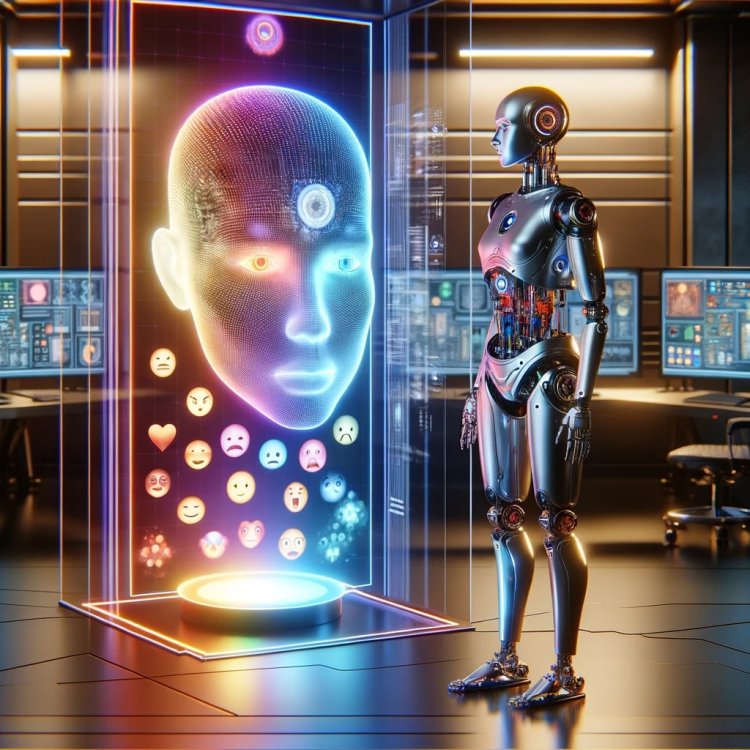Emotional Algorithms: Can AI Truly Understand Human Feelings?
This article delves into the fascinating world of artificial intelligence and its capabilities to understand and mimic human emotions. It examines the technological advancements that enable AI to interpret emotional cues, the potential applications of emotionally intelligent AI, and the ethical considerations that accompany this technology. The piece invites readers to reflect on the nature of human emotions and the future of human-AI relationships, questioning whether machines can ever truly comprehend the depth of human feelings.

Imagine a world where your computer could sense when you're having a rough day and offer words of encouragement or your favorite song to cheer you up. Sounds like something out of a sci-fi novel, right? Well, we're edging closer to making this a reality with advancements in AI designed to interpret and even mimic human emotions. It's a fascinating journey that raises as many questions as it does possibilities—especially about how deep our connections with machines can go, what this means for our future, and the ethical lines we need to draw in the digital sand.
Once upon a time, AI's understanding of emotions was pretty basic. Think of a computer recognizing a smile in a photo. Fast forward to today, and it's a whole different ball game. Modern AI can not only tell when you're smiling but can also guess why—analyzing everything from your facial expression to the tone of your voice. This leap from basic pattern recognition to understanding complex emotions has opened up a world of possibilities, from transforming customer service to offering new ways to support mental health.
But let's get real for a moment. Can you genuinely bond with a machine? It's a question that gets a lot of mixed feelings. On one hand, robots and virtual assistants that can interact with us on an emotional level might seem like the perfect buddies. Yet, there's an ongoing debate about how real these connections are. Are we just fooling ourselves into feeling understood by something that's essentially following a script?
This leap into emotional AI isn't just about making our interactions with gadgets more pleasant; it's also paving the way for some seriously futuristic therapy and mental health support. The idea is that AI could become a sort of emotional health assistant, spotting signs of distress and offering help when needed. But as you can imagine, diving deep into our emotional lives brings up a ton of privacy and ethical concerns. How do we feel about machines analyzing our feelings? And where do we draw the line to avoid emotional manipulation?
One of the biggest hurdles for emotional AI is getting the context right. Human emotions are complex and influenced by a maze of factors like culture, situation, and individual personality. This subtlety often gets lost in translation with AI, which still struggles to grasp the full spectrum of human feelings.
Despite these challenges, the potential benefits of emotionally intelligent AI are hard to ignore. Imagine technology that not only helps identify when someone's struggling emotionally but also offers interventions tailored to their needs. That's a game-changer, especially when you consider the global scope and the need to respect cultural differences in how emotions are expressed.
Looking to the future, it's clear that emotionally intelligent AI is set to play a bigger role in our lives. From enhancing how we interact with technology to offering new ways to support our emotional well-being, the possibilities are as exciting as they are daunting. Public opinion is split, with excitement about the potential benefits tempered by concerns over privacy and the authenticity of our interactions with AI.
What's perhaps most intriguing is how this technology is blending with human creativity. From art and music to literature, AI's understanding of emotions is opening up new avenues for collaboration, pushing the boundaries of what's possible when human and machine work together.
As we navigate this brave new world, it's crucial that we develop ethical frameworks to guide the responsible creation and use of emotional AI. Balancing innovation with respect for privacy and emotional integrity will be key to ensuring that this technology enhances our lives in positive ways.
So, there you have it—a glimpse into the not-so-distant future where AI might just understand your feelings better than you do. It's a thrilling prospect, but one that comes with its share of ethical dilemmas and challenges. As we continue to explore this frontier, the potential for deep, meaningful interactions with technology offers a tantalizing vision of what's to come.
What's Your Reaction?




















